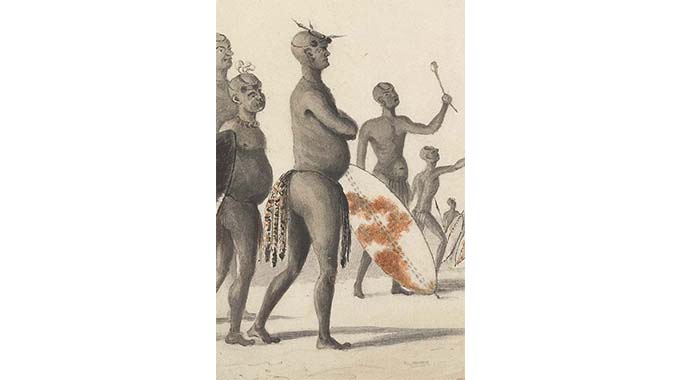
The Sunday News

Chief Mayisa
Chief Lotshe Hlabangana rose to prominence in the reign of King Lobengula ka Mzilikazi ka Matshobana, occupying the lofty position of chief advisor equivalent to Prime Minister in the modern day.
So much did King Lobengula trust Chief Lotshe Hlabangana, a chief he inherited, that he sent him with Babeyana Masuku as emissaries to meet Queen Victoria in London in 1888. The first-ever official ambassadors from Zimbabwe to the UK. That mission contributed to Chief Lotshes’s downfall.
Lotshe came from the Nguni clan of Amantshali. Matshobana the father of King Mzilikazi and his brother Bheje were born of Mtshali women. The Mtshali people were quite famous in King Mzilikazis nation but none more than Lotshe and his brother Mbambelele kaHlabangana ka Mlotha.

Art of King Mzilikazi
Lotshe fought the battles of Sikhwebezini against Malandela and the famous battle of Entumbane against King Tshaka’s regiments, a battle that resulted in the nation being called Amahlabezulu (the ones who stabbed the Zulus).
The battle-hardened Lotshe was appointed chief of Induba regiment, settled in Egabheni town by the Marico River in Northwest South Africa. It was there that Lotshe fought against the Boers in the battle of Mosega and Vegkop in 1837 that drove the Matabele north of Limpopo.
Upon the passing of King Mzilikazi in 1868, Lotshe became King Lobengula’s right-hand man and executioner. During the fight to establish himself as the undisputed king, Lobengula sent Lotshe with Amanxusa death squads to assassinate Lobengula’s brothers and rivals, mostly by strangling them.
Lotshe, an intelligent man who understood the times was sent to England with Babeyane Masuku to meet Queen Victoria in 1888.
He witnessed British firepower in an artillery display at Shoeburyness, a naval warfare drill, and also viewed the British armaments in Arsenal, North London.
Lotshe was convinced there was no way the Ndebele with their spears and shields could ever defeat the might of the British.
He knew any such victory would be short-lived like the Zulu battle of Isandlwana in 1879 which didn’t stop the defeat and exile of King Cetshwayo.
Lotshe advised King Lobengula to make Matabeleland a British protectorate like Khama had done with Bechuanaland (Botswana).
The other Ndebele chiefs accused him of being a sellout, and that Lotshe had been bribed by Queen Victoria through the gifts she gave him including a mirror.
Lobengula was willing to listen to Lotshe and ignored the conspiracy theories. The final straw came when Lotshe was accused of witchcraft, a crime punishable by death. He was accused of witchcraft for his ability to “capture the sun and put it in his hands using the mirror”.
With such “damning evidence”, and the chiefs frothing with jealousy over Lotshe’s gifts from the Queen and baying for Lotshe’s blood, Lobengula gave the order, and his trusted Prime Minister Lotshe Hlabangana was killed in cold blood.
But his story doesn’t end there. Among Lotshe’s family survivors was a man called Sitshenkwa Hlabangana who became a London Missionary Society Reverend and educated his sons, the most prominent of whom are the famous educationist Tennyson Hlabangana, Jeremiah, and Cephas Hlabangana.
Tennyson Hlabangana was the first black graduate in Rhodesia (Zimbabwe). Others may know Vana Hlabangana who was Highlanders Football Club chairman. Lotshe was vindicated in November 1893 when the British invasion forces smashed Lobengula’s regiments including the crack Imbizo commandos at Gadade.
Lobengula fled, torching his royal city of Bulawayo. As he fled he issued a lamentation “yek’uLotshe” (translated Lotshe has been vindicated). King Lobengula crossed the Zambezi River and died in Zambia under the care of Ngoni Chief Mpezeni, son of Ndwandwe general Zwangendaba. — (source: Chief Mayisa @jqmayisa).



